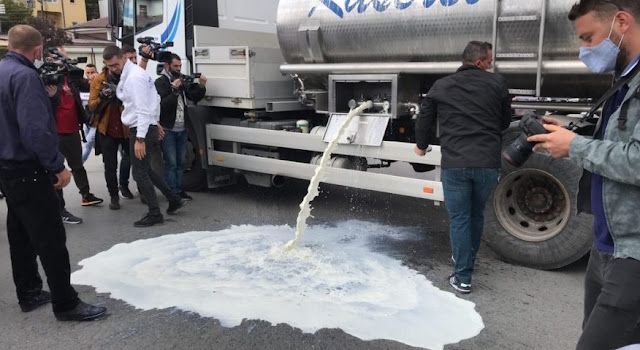 |
| Farmers pouring milk on the streets of Prishtina |
Many commercial farmers in Kosovo, on a daily basis, deliver fresh milk to collection points that are licensed by the competent authorities.
The milk then processes cheese, cottage cheese and yogurt which are sent to shop windows in Kosovo.
Why has the purchasing power of this product decreased?
The purchasing power of dairy products has decreased in the market. Large quantities have remained unsold in the warehouses of manufacturing companies, because in the market circulate these type of goods processed from palm oil. Palm oil is imported from various countries in the region and Europe, say representatives of the Association of Dairy Farmers.
According to them, the import of palm oil should be stopped in order to create a market for local milk.
The dairy processing industry is considered to have sufficient capacities to cover the Kosovar market, but nevertheless, this sector also suffers from import dependence, specifically from palm oil.
In Kosovo, according to the Association of Dairy Farmers, 60 percent of dairy products are imported from countries in the region and Europe, while only 40 percent of the market is covered by local production.
Removal of palm oil products is required
Outraged by the government's inaction on the removal of palm oil products, Kosovo dairies on Tuesday, September 29, in the morning, had a meeting with Kosovo Prime Minister Avdullah Hoti, and in the afternoon held a protest.
Whereas, Prime Minister Avdullah Hoti, has expressed the commitment to be close to them, as he said, "to improve the situation that this sector is facing".
At this meeting it was agreed that the government undertakes within the Economic Recovery Package to subsidize domestic production, including milk production in the amount of 25 percent of the price of milk and dairy products in stock.
Government subsidies will only be made for dairy products, not products that have other substances, such as powdered or palm oil-based milk.
For every liter of milk produced so far, the Government of Kosovo has subsidized 6 cents, 4 cents and 2 cents per liter. At the government meeting, which was held on Monday, a decision was made to double this value to 12 cents, 8 cents and 4 cents per liter, depending on the quality of milk.
Palm oil is a plant-based food, which is extracted from the squeezing of oily palm fruit. In recent years, the percentage of imports of this oil in Kosovo has increased.
Prime Minister Avdullah Hoti has promised that there will be strict control over the import of palm oil and the import of milk powder, to know which milk processors are importing and how they are using these products because the Government is interested to support local production.
The 2016 report of the European Food Safety Authority (EFSA) has assessed that the use of palm oil in food production is harmful.
The Ministry of Trade and Industry, on September 11 this year, has decided to temporarily ban palm oil and the import of cheese and similar cheese products with vegetable fat (palm oil).
This decision was taken at the request of the Kosovo Dairy Industry Association and the Dairy Producers Association, as well as concerns raised by the Kosovo Chamber of Commerce to increase the amount of palm oil imports.
The European Parliament has issued a resolution urging the European Commission to take measures to phase out the use of vegetable oils, including palm oil, possibly by 2020.
According to the Dairy Industry Association, this industry has about 2,500 workers in the production chain and over 3,000 workers in the distribution chain.

